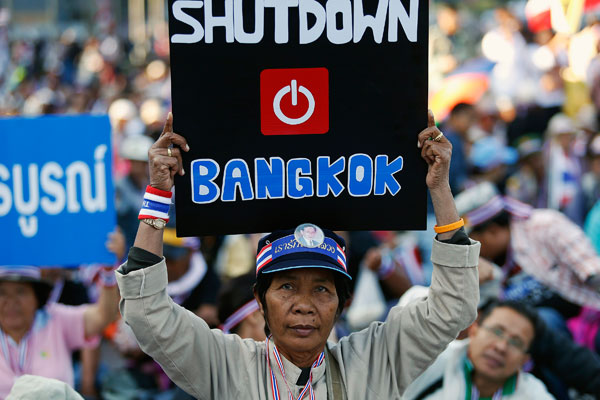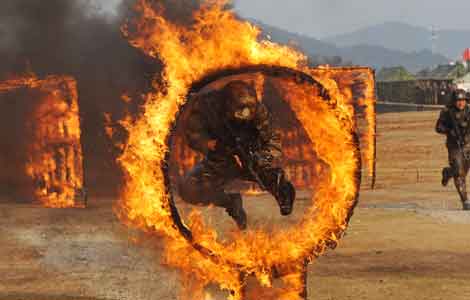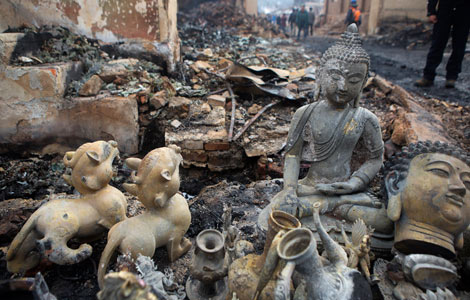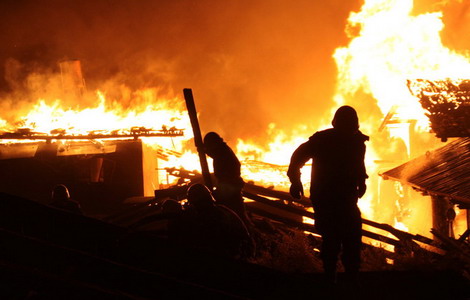Bangkok unrest hurts major projects and tourism industry
Updated: 2014-01-14 02:20
By ZHAO YANRONG in Beijing and LI LI from Xinhua in Bangkok (China Daily)
|
||||||||
Thousands of protesters block key junctions in Thai capital
 |
|
Protesters occupy a major street in central Bangkok on Monday in an attempt to shut down the Thai capital, escalating a campaign to unseat Prime Minister Yingluck Shinawatra. ATHIT PERAWONGMETHA / REUTERS |
Thailand may see its projects with China delayed and fewer Chinese tourists visiting the country, analysts said on Monday as protesters attempted to cripple Bangkok.
Thousands of demonstrators blockaded several major intersections, demanding a "shutdown" of the Thai capital in an attempt to force Prime Minister Yingluck Shinawatra to step down.
The upheaval is the latest chapter in an eight-year conflict pitting Bangkok's middle class and royalist establishment against the mostly poorer, rural supporters of Yingluck and her self-exiled brother, former premier Thaksin Shinawatra.
"The unrest not only damages economic development in Thailand, but also affects regional cooperation, such as the cooperation between China and Thailand," said Song Qingrun, a Southeast Asian studies researcher at the China Institutes of Contemporary International Relations.
Economic ties between the two countries have improved in recent years. China is Thailand's largest export market and its second-largest source of imports. The two governments work jointly in industries such as railway construction, water resources, clean energy and education.
Since Yingluck took office, the Thai government has eyed major projects including building public facilities and water control projects in cooperation with China.
The infrastructure programs, approved by the Thai parliament in November, had not reached the planning stage. China is seen as one of the most capable bidders for the infrastructure program, particularly with the construction of high-speed trains.
Even though the Thai transport minister has said that if the Yingluck administration steps down it will not mean the automatic cancellation of these infrastructure programs, invitations for bids from international companies have sometimes been delayed.
"If there is a shift of power in Thailand, the damage to Sino-Thai cooperation is likely to worsen," Song said.
Chinese investment in Thailand is small but has large potential to grow, according to a report by the Kasikorn Bank Research Center in Thailand.
The report said that Chinese invested 4 billion baht ($120 million) in 18 projects in Thailand from January to August, comprising 1.14 percent of foreign investment in the country.
As a pillar industry in Thailand, the tourism sector has been affected by the protest, with more than 45 countries and regions issuing travel warnings.
More than $140 million was spent by 100,000 Chinese tourists in Thailand during the Spring Festival holiday week in 2013, according to the Thai Tourism Authority, which had been looking forward to large numbers of Chinese visitors for this year's holiday week.
But as there is no sign of a political reconciliation and the situation worsens, tourist income may drop sharply.
Yan Xin, a public affairs manager at Ctrip, a Chinese online travel agency, said Thailand as a whole remains a favorite travel destination for Chinese, but Bangkok is losing its appeal.
"Compared with last year, fewer people want to join group tours to Bangkok. Many tourists who intended to go to Bangkok have chosen Phuket and Chiang Mai instead," Yan said.
Several Chinese airlines have reduced flights to Thailand, Oriental Morning Post reported in Shanghai.
Travel agencies in Guangdong province have reported travelers canceling trips to Thailand during the Spring Festival holiday, while some agencies in Sichuan province and Shanghai have canceled group tours from Jan 12 to 17.
But the Thai market still has potential, a veteran business leader said.
Mai Weidong, former chairman of the Chinese-Thai Enterprises Association, said the political unrest has given businesses a hard time, but the difficulty is often temporary.
"More Chinese entrepreneurs are becoming familiar with the rhythm of Thai political and economic issues. As an export oriented-market, Thailand still has many opportunities for Chinese companies," Mai said.
Ren Qi in Beijing contributed to this story.
Most Viewed
Editor's Picks

|

|

|

|

|

|
Today's Top News
China is now No 1 in trade
PANDA! opens in Las Vegas
Rich Chinese tourists looking to space
Deals 'blow' against separatists
Sharp fall in tourism hits Beijing
Sharon's legacy full of contradictions
Lenovo targets US, but when?
Embraer extends coverage in China's aircraft market
US Weekly

|

|















